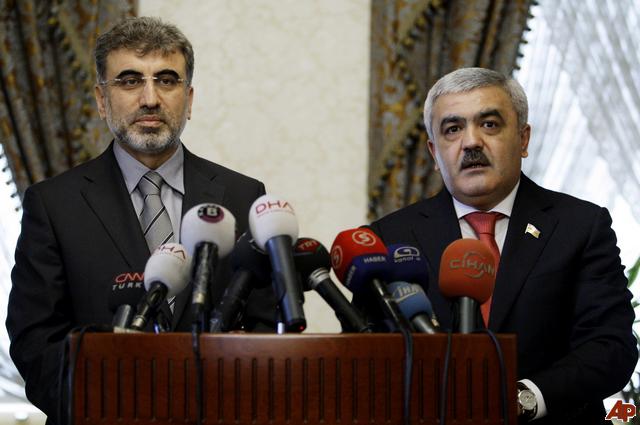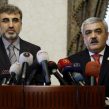
The Trans-Anatolia Gas Pipeline and Its Continuation Options to Europe
Publication: Eurasia Daily Monitor Volume: 9 Issue: 70
By:

Interested parties are considering joining, in one way or another, the Azerbaijani-Turkish Trans-Anatolia Gas Pipeline project (Turkic acronym: TANAP) across Turkey to the European Union’s border. Some of the same interested parties are competing against each other to provide a continuation route for TANAP into EU territory.
Azerbaijan’s State Oil Company has asked British Petroleum (BP), Norway’s Statoil and Total of France whether they are interested in joining the trans-Anatolia project in some form. According to Baku, these companies have tentatively expressed an interest in participating as gas shippers or minority shareholders in this project. BP, Statoil and Total are among shareholders in Azerbaijan’s Shah Deniz field, the gas source for the TANAP line’s first stage. Total is a shareholder as well as operator of Azerbaijan’s Absheron gas project, one of the probable sources for the trans-Anatolia line’s second stage (Trend, April 4, 5, 6).
In Central Europe, two solutions compete against each other to provide TANAP with a continuation route. One is an abridged Nabucco pipeline, running from the Turkish-Bulgarian border to Vienna. The other is an interconnection of existing pipelines along a roughly similar route, “South East Europe Pipeline(s)” (SEEP), improvised by British Petroleum (BP). The proposed line to Italy, known as Trans-Adriatic pipeline (TAP, led by Norway’s Statoil), is planned to run via Greece, Albania and the Adriatic seabed to a southern tip of the Italian peninsula.
In sum, three European continuations of TANAP are on the table as rival options, all dependent on Azerbaijani gas supplies and the Azerbaijan-Turkey transit route. Officially, the gas producers’ consortium at Shah Deniz in Azerbaijan will select one of those three options. Baku itself holds only 10 percent of that field consortium’s shares. However, Azerbaijan holds a controlling position combined with Turkey in the transit project. This should give Azerbaijan a decisive role in selecting the Trans-Anatolia pipeline’s continuation route into Europe.
Three distinct, partially conflicting sets of interests are at work in these projects. They variously involve producer companies’ interests, transit and trading interests, and the interests of consumer countries. All the interested parties will need to negotiate with Azerbaijan.
BP and Statoil are the main shareholders (25.5 percent each, with BP as technical operator) in the Shah Deniz gas producers’ consortium. BP and Statoil seek a quick-fix transportation solution for 10 bcm of gas annually from Shah Deniz Phase Two to Europe (a further 6 bcm being earmarked for Turkey). BP’s and Statoil’s interest seems limited to a “field solution,” short-term and non-strategic. For that limited volume, BP and Statoil were planning to rent corresponding capacities in Turkey’s pipelines.
While sharing a similar, narrow corporate perspective, BP and Statoil seem to compete against each other within the consortium itself over those 10 bcm per year from Shah Deniz Phase Two. That volume is insufficient for supporting both BP’s SEEP and Statoil’s TAP at the same time. Dividing that volume into two divergent European routes would render both of them nonviable.
This is another zero-sum contest over those same 10 bcm that had pitted Statoil and others against the Nabucco project until a few months ago. Those 10 bcm have to be regarded as indivisible and channeled into a single European route, for subsequent distribution in countries along that single route.
BP’s SEEP (see above) currently competes against Nabucco-West; their respective routes into Central Europe overlap for the most part. First proposed in September 2011, SEEP remains only a preliminary concept thus far. It proposes to scrap construction costs by using existing pipelines, pipeline segments, and inter-connectors from Turkey to Central Europe. However, BP-proposed cost savings are less of a distinct advantage in this case since Azerbaijan is prepared to finance the bulk of pipeline construction in Turkey proceeding from Azerbaijan’s national interest. SEEP’s proposed annual capacity of 10 bcm is almost certainly unscalable, involving as it does diverse owners in multiple national pipeline segments.
Statoil promotes the Greece-Albania-Italy route, an expression of rather marginal trading and transit interests. From Azerbaijan’s standpoint, this route seems less lucrative, compared with the Nabucco route. The Italian and Greek markets are already diversified, accessible also to LNG. Furthermore, they are less inter-connectible and less integrated on a regional basis, compared with the Nabucco countries. Statoil intends to transport or swap some of the Azerbaijani gas to its consortium partner, Swiss EGL, via Italy.
The would-be transit countries, Greece and Albania, are not represented in this consortium, but are keen to provide a transit service for Statoil-marketed Azerbaijani gas and to retain some small volumes for their own use. Albanian Prime Minister Sali Berisha has asked Turkey’s Prime Minister Recep Tayyp Erdogan to endorse this route; and has invited Azerbaijan’s State Oil Company to bid for a stake in AlbPetrol, the Albanian state-owned oil company (Anatolia news agency, April 6).
The reconfigured Nabucco project (“Nabucco-West”) expresses the interests of European consumer countries along this route (Bulgaria, Romania, Hungary, Austria, plus German RWE). These countries are overdependent on Russian Gazprom and eager for supply diversification. Accessing Caspian gas supplies is not merely a trading or transit interest, but a national interest and energy security imperative for the Nabucco countries. To underscore its significance, Bulgaria declared Nabucco-West an “object of national importance” with priority status. This status facilitates and accelerates the permitting and licensing procedures for building Nabucco-West’s Bulgarian section, a direct continuation route from the Trans-Anatolia line into Central Europe (Novinite, April 4).
As distinct advantages, Nabucco-West inherits the inter-governmental agreements, project support agreements, and uniform European legal-regulatory regime, already established with the earlier configuration of the project. Nabucco can dovetail seamlessly with the Trans-Anatolia project at the Turkish-Bulgarian border. The Nabucco countries’ gas networks are, or will soon be, well inter-connected. Driven by diversification goals, market demand for Azerbaijani gas is strongest in the Nabucco countries. The EU supports these countries’ supply diversification goals. Among the existing options, therefore, Nabucco-West seems the optimal continuation route for the Trans-Anatolia line into Europe.




